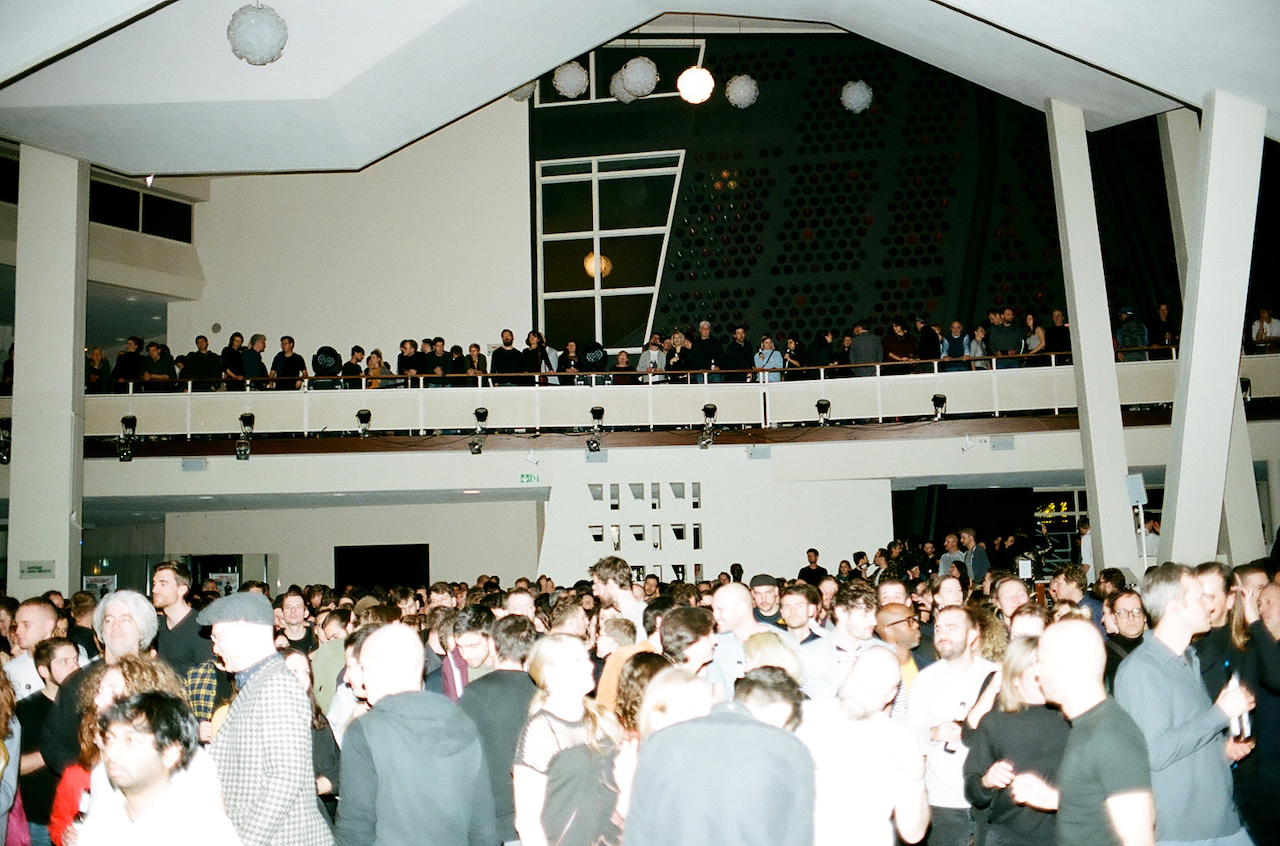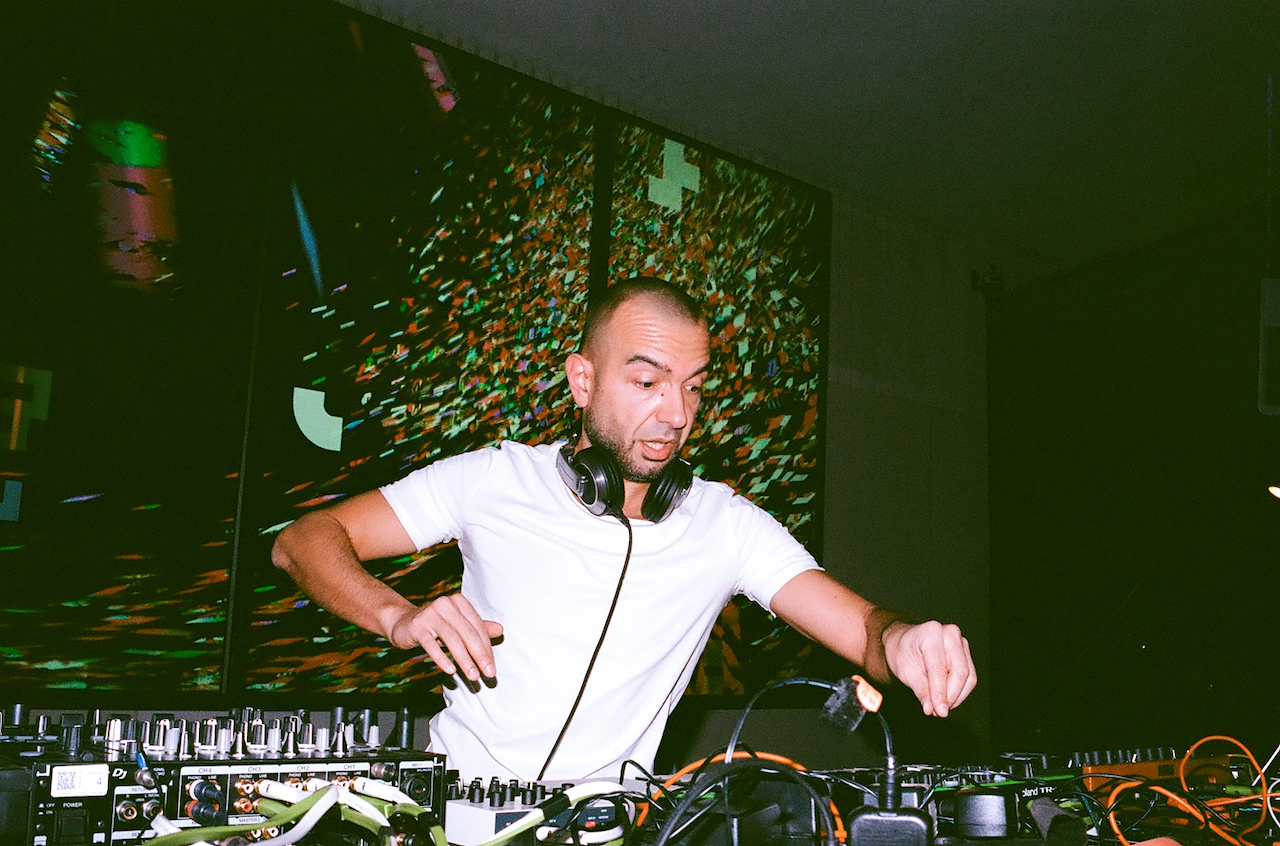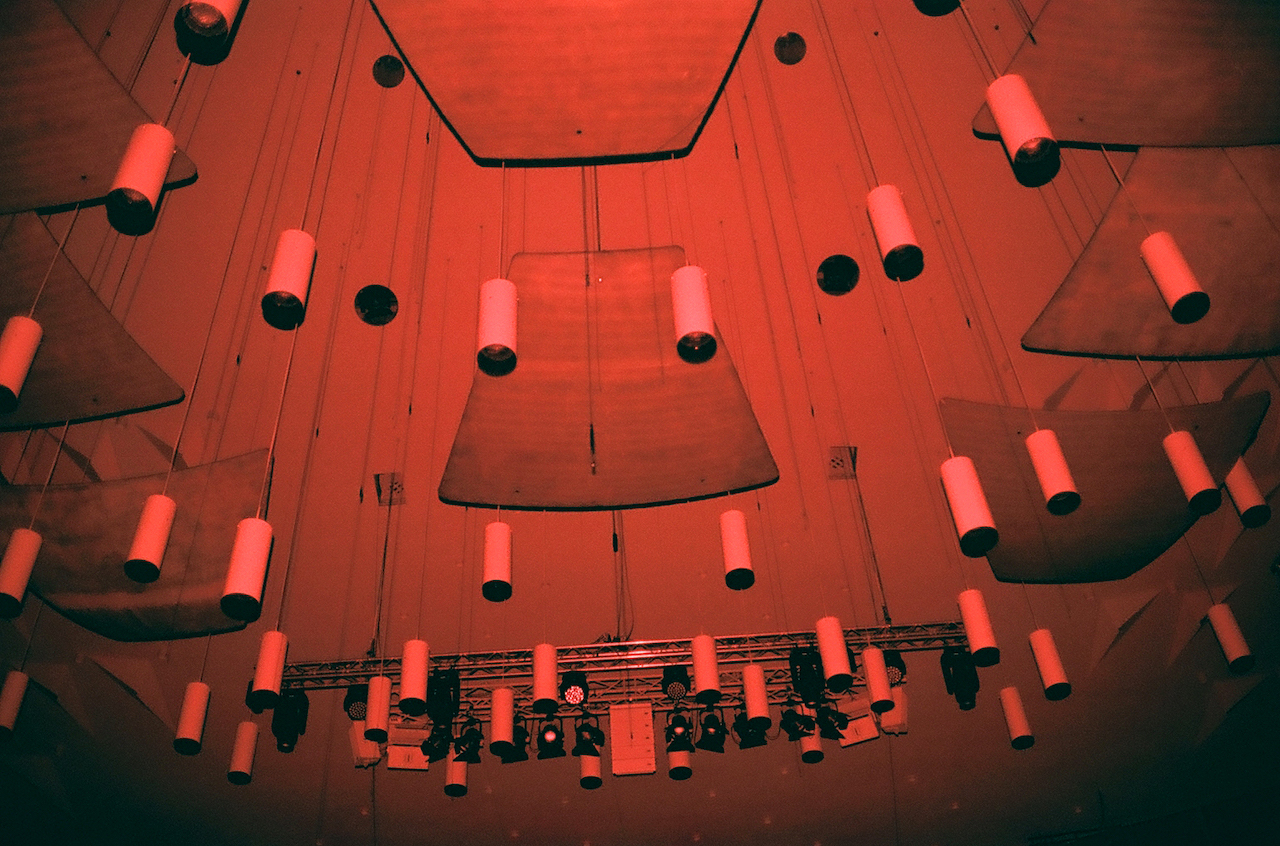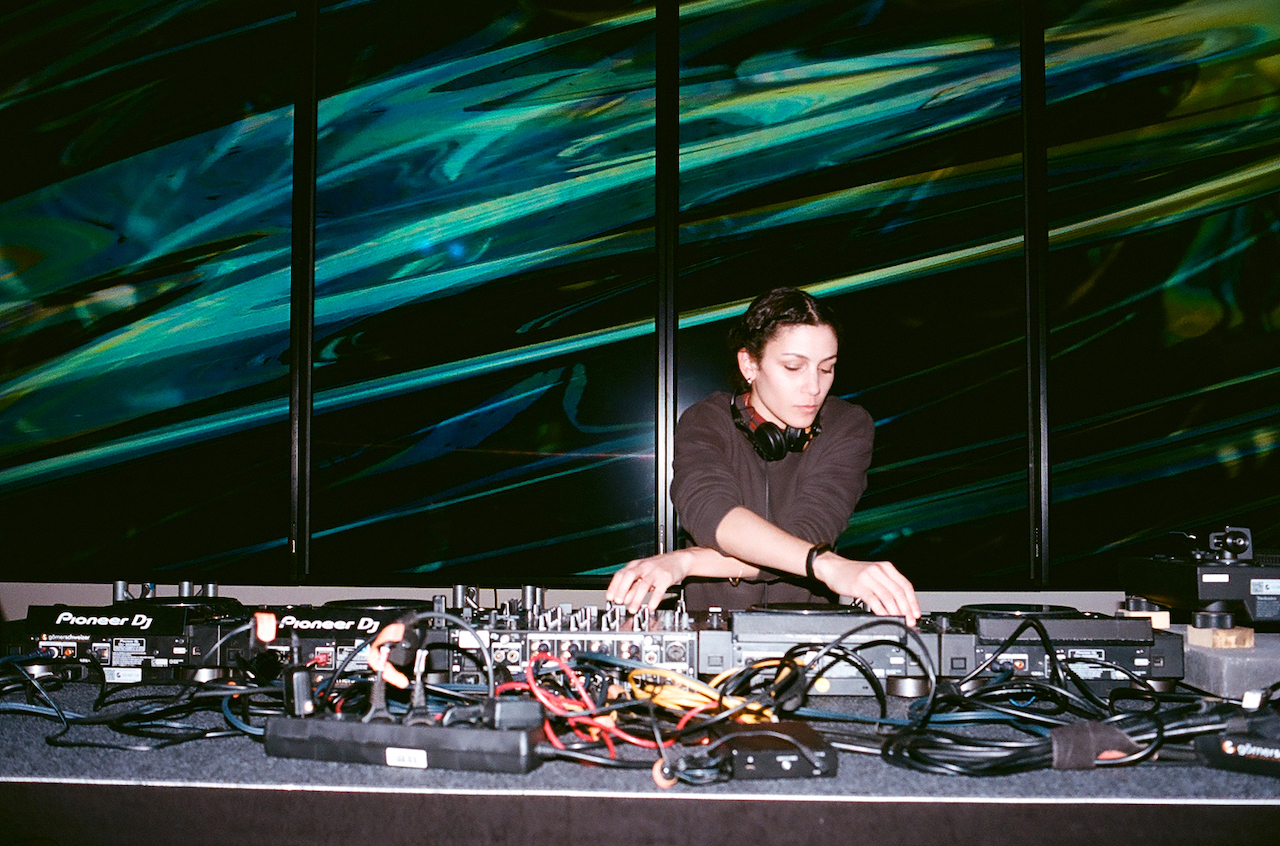- One of the world's great classical music centres hosts its first electronic festival.
- The first piece performed at Berliner Philharmonie, the world-renowned classical music centre opened in 1963, was Beethoven's Ninth Symphony. Nearly 60 years later, the German composer remains a big draw, with an upcoming "Beethoven Marathon" advertised on the building's side. Last weekend, the venue tried something a little different, hosting its first-ever electronic music festival. "There is practically everything in Berlin," Strom's curator, Stefan Goldmann, told me via email, "except for a chance for electronic musicians to work with the acoustic setting of one of the city's concert halls." People bought into the idea, and both nights completely sold out.
Strom, which means "electricity" in German, kept things nice and simple: five acts performed on each day, alternating between the foyer and Großer Saal, a stunning 2400-seat auditorium. Funktion-One stacks provided loud, pitch-perfect sound, particularly in the main hall, where the bass rumbled with warmth and precision. When I arrived just after doors on Friday evening, the foyer was already busy, with people dotted across numerous levels and staircases, every possible vantage point claimed. While Don't DJ rolled out tunes with odd rhythms, I surveyed the crowd, a real hodgepodge of ages and styles, easily the most mixed I've seen in Berlin. Some sank Fritz-kolas and gnawed on pretzels; others washed down smoked-salmon canapés with flutes of crémant.
The vibe for the first couple hours was stiff, as it so often is at electronic events in cultural institutions. The atmosphere in these spaces isn't conducive to letting loose. People stand around, nursing drinks, unsure of how to act. There's a reason this music flourishes in dark, dirty warehouses. After Goldmann eked out bleepy ambient in a half-full Großer Saal, I watched Voiski play full-throttle techno and acid to a hesitant audience in the well-lit foyer. It was a strange sight. I wasn't sure if things would improve.
But then, thanks to Kruder & Dorfmeister, they did. Playing in Großer Saal, the revered Austrian duo weaved together house, hip-hop, trip-hop and drum & bass, their chugging grooves and organic sound palette causing greying men to holler like teenagers. Seats were abandoned, aisles filled with swaying couples and, between the stage and the front row, a thin, thronging dance floor formed. When the vocal from Depeche Mode's "Personal Jesus" emerged over a dusty beat, a woman two rows back let out a cry: "oh my God!" This spirit carried through to the night's final act, KiNK, whose techy tricks and cheeky demeanour transformed the foyer into a whooping rave. The atmosphere had flipped.
Saturday warmed up faster. Midway into Deena Abdelwahed's DJ set, the foyer suddenly stopped toe-tapping and began properly dancing. One girl flailed like she was at a rock concert. I watched from one floor up, where the view was great but the sound clarity dipped. Abdelwahed's heavy workouts smothered the upper levels in bass, making the whole building rattle. Ryoji Ikeda, the night's main event in Großer Saal, didn't have this problem. His sublime bleeps and squalls pinged wonderfully around the room, the intensity of the noise amplified by strobing black-and-white visuals of abstract shapes and computer code. It wasn't for everyone—many people got up and left—but those who endured experienced electronic music in its purest form, devoid of melody or human touch. And yet, buried deep in the mechanical glitches, were seriously rude grooves.
So what to make of Strom? There was plenty to like: intriguing curation, exquisite sound, the chance to watch excellent electronic music from the comfort of a cushioned chair. What it lacked, perhaps, was an identity beyond the novelty of listening to this music in this venue. That alone was enough for the Großer Saal performances—few concert halls look and sound as spectacular—but the foyer, though cool, didn't have the same oomph. (Dimming the lights would've helped.) Could the festival use another space within this architectural marvel? Hopefully next year we'll find out.
Photo credits /
Stephan Rabold - Stefan Goldmann (Lead)
Frankie Casillo - All others
 The vibe for the first couple hours was stiff, as it so often is at electronic events in cultural institutions. The atmosphere in these spaces isn't conducive to letting loose. People stand around, nursing drinks, unsure of how to act. There's a reason this music flourishes in dark, dirty warehouses. After Goldmann eked out bleepy ambient in a half-full Großer Saal, I watched Voiski play full-throttle techno and acid to a hesitant audience in the well-lit foyer. It was a strange sight. I wasn't sure if things would improve. But then, thanks to Kruder & Dorfmeister, they did. Playing in Großer Saal, the revered Austrian duo weaved together house, hip-hop, trip-hop and drum & bass, their chugging grooves and organic sound palette causing greying men to holler like teenagers. Seats were abandoned, aisles filled with swaying couples and, between the stage and the front row, a thin, thronging dance floor formed. When the vocal from Depeche Mode's "Personal Jesus" emerged over a dusty beat, a woman two rows back let out a cry: "oh my God!" This spirit carried through to the night's final act, KiNK, whose techy tricks and cheeky demeanour transformed the foyer into a whooping rave. The atmosphere had flipped.
The vibe for the first couple hours was stiff, as it so often is at electronic events in cultural institutions. The atmosphere in these spaces isn't conducive to letting loose. People stand around, nursing drinks, unsure of how to act. There's a reason this music flourishes in dark, dirty warehouses. After Goldmann eked out bleepy ambient in a half-full Großer Saal, I watched Voiski play full-throttle techno and acid to a hesitant audience in the well-lit foyer. It was a strange sight. I wasn't sure if things would improve. But then, thanks to Kruder & Dorfmeister, they did. Playing in Großer Saal, the revered Austrian duo weaved together house, hip-hop, trip-hop and drum & bass, their chugging grooves and organic sound palette causing greying men to holler like teenagers. Seats were abandoned, aisles filled with swaying couples and, between the stage and the front row, a thin, thronging dance floor formed. When the vocal from Depeche Mode's "Personal Jesus" emerged over a dusty beat, a woman two rows back let out a cry: "oh my God!" This spirit carried through to the night's final act, KiNK, whose techy tricks and cheeky demeanour transformed the foyer into a whooping rave. The atmosphere had flipped.
 Saturday warmed up faster. Midway into Deena Abdelwahed's DJ set, the foyer suddenly stopped toe-tapping and began properly dancing. One girl flailed like she was at a rock concert. I watched from one floor up, where the view was great but the sound clarity dipped. Abdelwahed's heavy workouts smothered the upper levels in bass, making the whole building rattle. Ryoji Ikeda, the night's main event in Großer Saal, didn't have this problem. His sublime bleeps and squalls pinged wonderfully around the room, the intensity of the noise amplified by strobing black-and-white visuals of abstract shapes and computer code. It wasn't for everyone—many people got up and left—but those who endured experienced electronic music in its purest form, devoid of melody or human touch. And yet, buried deep in the mechanical glitches, were seriously rude grooves. So what to make of Strom? There was plenty to like: intriguing curation, exquisite sound, the chance to watch excellent electronic music from the comfort of a cushioned chair. What it lacked, perhaps, was an identity beyond the novelty of listening to this music in this venue. That alone was enough for the Großer Saal performances—few concert halls look and sound as spectacular—but the foyer, though cool, didn't have the same oomph. (Dimming the lights would've helped.) Could the festival use another space within this architectural marvel? Hopefully next year we'll find out. Photo credits / Stephan Rabold - Stefan Goldmann (Lead) Frankie Casillo - All others
Saturday warmed up faster. Midway into Deena Abdelwahed's DJ set, the foyer suddenly stopped toe-tapping and began properly dancing. One girl flailed like she was at a rock concert. I watched from one floor up, where the view was great but the sound clarity dipped. Abdelwahed's heavy workouts smothered the upper levels in bass, making the whole building rattle. Ryoji Ikeda, the night's main event in Großer Saal, didn't have this problem. His sublime bleeps and squalls pinged wonderfully around the room, the intensity of the noise amplified by strobing black-and-white visuals of abstract shapes and computer code. It wasn't for everyone—many people got up and left—but those who endured experienced electronic music in its purest form, devoid of melody or human touch. And yet, buried deep in the mechanical glitches, were seriously rude grooves. So what to make of Strom? There was plenty to like: intriguing curation, exquisite sound, the chance to watch excellent electronic music from the comfort of a cushioned chair. What it lacked, perhaps, was an identity beyond the novelty of listening to this music in this venue. That alone was enough for the Großer Saal performances—few concert halls look and sound as spectacular—but the foyer, though cool, didn't have the same oomph. (Dimming the lights would've helped.) Could the festival use another space within this architectural marvel? Hopefully next year we'll find out. Photo credits / Stephan Rabold - Stefan Goldmann (Lead) Frankie Casillo - All others